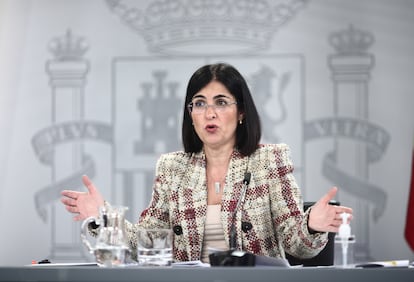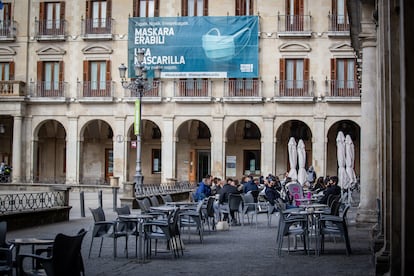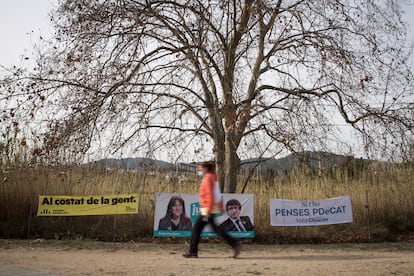Spanish government extends travel restrictions on arrivals from the UK, South Africa and Brazil
Meanwhile, Catalonia has announced it will be vaccinating teachers alongside essential workers, while in the Basque Country bars and restaurants will be temporarily reopening after mounting a legal challenge against their closure

Spain’s health minister, Carolina Darias, announced today that passengers on flights and ships arriving in the country from the United Kingdom, Brazil and South Africa will continue to be subject to restrictions. The aim is to prevent the arrival of more-infectious variants of the coronavirus that have been detected in those countries.
Current rules state that only Spanish citizens or people with other nationalities who have official residency in Spain or Andorra can fly or sail into the country from the United Kingdom, Brazil or South Africa. This restriction will be extended until March 2. A negative PCR test or similar carried out within 72 hours prior to arrival is also required.
Passengers traveling from Brazil and South Africa, meanwhile, are also now being given “antigen tests in the airport” according to the minister, in an attempt to “strengthen” the health controls.
There are currently no direct flights between South Africa and Spain, meaning that the restrictions will apply to passengers whose journeys begin there and make a stopover in a third country.
Meanwhile, travelers from Spain to England will from Monday onward have to not only present a negative PCR test taken 72 hours before travel and isolate for 10 days, but will also have to take two more tests – on the second and eighth day of quarantine. The cost of these three tests will have to be paid for by each passenger. Travelers to England from 33 “high risk” countries, including South Africa, Brazil and Portugal, will soon be required to self-isolate in hotels for 10 days, also at their own cost.
Portugal restrictions
On Tuesday, the Spanish government opted to extend controls along its land border with Portugal until March 1, given that the neighboring country is still struggling to bring down coronavirus infections and deaths. The countries’ governments had closed the border on January 28 for all non-essential travel, with some exceptions.
Basque Country

Bars and restaurants in the Basque Country will be able to reopen from Wednesday onward, despite an order from the regional government to close them in municipalities where there are high rates of coronavirus infection.
The regional High Court on Tuesday accepted a request from hostelry associations to temporarily suspend the measure, on the basis that the activity of such establishments is not “a genuine and serious element of risk for public health,” as the regional government had argued when ordering the closures. The regional government will be able to appeal this move.
The ruling is a blow to the regional government, which in January adopted measures that included the closure of establishments where the 14-day cumulative number of coronavirus cases per 100,000 inhabitants is 500 or above. A total of 84 municipalities were in this situation, 46 of them with more than 5,000 inhabitants (including the capitals of Vitoria, Bilbao and San Sebastián).
This is the third time that judges have put a stop to measures taken by the Basque regional government. Previous incidents of this kind prompted the lehendakari, as the regional premier is known, to call on the central government to implement a new state of alarm giving the country’s regions more legal powers to introduce coronavirus restrictions, something that was approved in October for a six-month period.
Catalonia

In Catalonia, the general secretary for public health, Josep Maria Argimon, confirmed that teachers in the region will be considered essential workers and as such will receive the Covid-19 vaccine “over the next three months.”
This will put teaching staff in Catalonia on the same level as emergency workers and pharmacists, who will start to receive their inoculations against the coronavirus from this week onward.
“Teaching staff are not getting left out,” said Argimon during an interview with Catalunya Ràdio. “They are part of this group of [essential workers] but not all of them will be able to get the vaccine on the first day. This is a collective that we are planning on vaccinating over the coming three months.”
Catalan elections
Also in Catalonia, the regional government has estimated that around 14,000 people who are currently positive with Covid-19 could take part in the upcoming regional election on Sunday, February 14. That was according to the general secretary for public health, Josep Maria Argimon, also while speaking on Catalunya Ràdio. The government is estimating that around 70,000 close contacts of these positive cases could turn out to vote, given that each positive is thought to have an average of 4.5 contacts. “It would be better if they stayed home, but they also have the right to vote,” the secretary admitted.
The pandemic has already had an effect on the polls, with 25,000 members of the public who had been randomly selected to man voting stations filing reasons as to why they should be excused from the duty. The regional government has stated that 99% of the 9,139 voting stations in the region will be properly manned and functioning, with the minimum staffing level necessary of a president and two members.
During Tuesday’s press conference after the weekly Cabinet meeting, Finance Minister María Jesús Montero called on residents of Catalonia to participate in the election, and sought to reassure citizens that the process would take place “with all of the guarantees needed to protect people’s health and right to vote.”
Based on reporting by Rafa de Miguel, Mikel Ormazabal and Bernat Coll.
English version by Simon Hunter.
Tu suscripción se está usando en otro dispositivo
¿Quieres añadir otro usuario a tu suscripción?
Si continúas leyendo en este dispositivo, no se podrá leer en el otro.
FlechaTu suscripción se está usando en otro dispositivo y solo puedes acceder a EL PAÍS desde un dispositivo a la vez.
Si quieres compartir tu cuenta, cambia tu suscripción a la modalidad Premium, así podrás añadir otro usuario. Cada uno accederá con su propia cuenta de email, lo que os permitirá personalizar vuestra experiencia en EL PAÍS.
¿Tienes una suscripción de empresa? Accede aquí para contratar más cuentas.
En el caso de no saber quién está usando tu cuenta, te recomendamos cambiar tu contraseña aquí.
Si decides continuar compartiendo tu cuenta, este mensaje se mostrará en tu dispositivo y en el de la otra persona que está usando tu cuenta de forma indefinida, afectando a tu experiencia de lectura. Puedes consultar aquí los términos y condiciones de la suscripción digital.








































